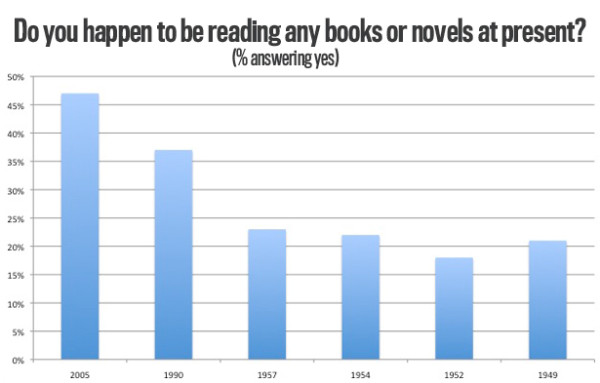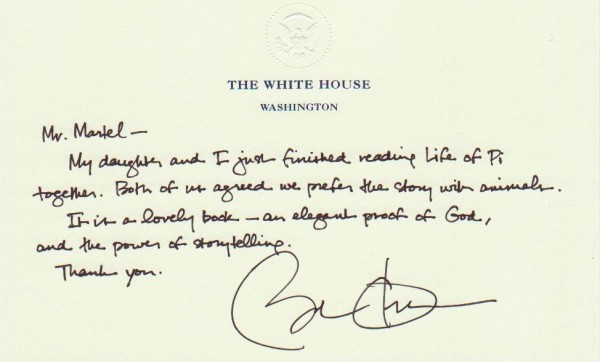
Alexis Madrigal: “our collective memory of the past is astoundingly inaccurate. Not only has the number of people reading not declined precipitously, it’s actually gone up since the perceived golden age of American letters.”
Official website of the author

Alexis Madrigal: “our collective memory of the past is astoundingly inaccurate. Not only has the number of people reading not declined precipitously, it’s actually gone up since the perceived golden age of American letters.”

Canadian author Yann Martel received this note from President Obama, out of the blue, about his novel Life of Pi. (Full story here. Larger image here. Via.) Canada’s own prime minister, on the other hand, “sounds and governs like one who cares little for the arts,” Martel writes, speculating that the prime minister may feel he is too busy.
To read a book, one must be still. To watch a concert, a play, a movie, to look at a painting, one must be still. Religion, too, makes use of stillness, notably with prayer and meditation. Just gazing upon a still lake, upon a quiet winter scene — doesn’t that lull us into contemplation? Life, it seems, favours moments of stillness to appear on the edges of our perception and whisper to us, “Here I am. What do you think?” Then we become busy and the stillness vanishes, yet we hardly notice because we fall so easily for the delusion of busyness, whereby what keeps us busy must be important, and the busier we are with it, the more important it must be. And so we work, work, work, rush, rush, rush. On occasion we say to ourselves, panting, “Gosh, life is racing by.” But that’s not it at all, it’s the contrary: life is still. It is we who are racing by.
Sven Birkerts on reading in a digital age in which “the novel is the vital antidote to the mentality that the Internet promotes”:
We always hear arguments about how the original time-passing function of the triple-decker novel has been rendered obsolete by competing media. What we hear less is the idea that the novel serves and embodies a certain interior pace, and that this has been shouted down (but not eliminated) by the transformations of modern life.
The essay takes a while to find its feet, in part because Birkerts seems to be thinking through the problem as he writes, but also because the subject is so damn complicated — how do we read novels now, and why bother?